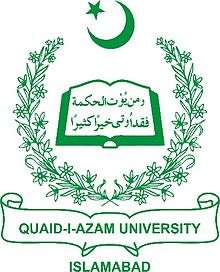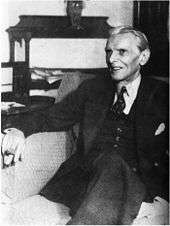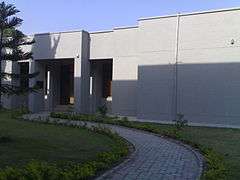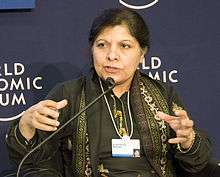Quaid-i-Azam University
 | |
Former names | University of Islamabad |
|---|---|
| Motto | وَمَن يُؤْتَ الْحِكْمَةَ فَقَدْ أُوتِيَ خَيْرًا كَثِيرًا |
Motto in English | 'And he to whom wisdom is granted receiveth indeed a benefit overflowing'[1] |
| Type | Public |
| Established | 1967 |
| Chancellor | President of Pakistan |
| Vice-Chancellor | Dr. Javed Ashraf |
| Students | 7,800[2] |
| Location |
Islamabad, Pakistan 33°44′50″N 73°08′20″E / 33.74722°N 73.13889°ECoordinates: 33°44′50″N 73°08′20″E / 33.74722°N 73.13889°E |
| Campus | Urban |
| Colours | Blue and white |
| Nickname | QAU |
| Affiliations | HEC |
| Website |
www |
The Quaid-i-Azam University or Quaid-e-Azam University (Urdu: جامعہ قائداعظم; simply QAU) is a public research university located in Islamabad, Pakistan.[3]
Founded as the University of Islamabad in 1977, it was initially dedicated to the study of postgraduate education but expanded through the 1980s to an interdisciplinarity university offering both under and post graduate education.[2] The university has, as of 2015, grown into the largest varsity in Islamabad with a total enrollment excedding 13,000 students.[2] The university is located on a 1700 acres (or 6.9 km²) capmus on the foothills of the Margalla.[4]
Divided into four faculties and nine affiliated research institutes, QAU is among Pakistan's largest and highest ranked public universities.[5][6] Globally, it is has been consistently ranked among the top 700 varisity's in the world by the QS World University Rankings[7] while it's regional publications ranked QAU among 120 in Asia in 2013.[8] While the Times Higher Education World University Rankings ranked it between 501-600 globally and top 120 in Asia in 2014.[9][10]
The university is nationally known for its research, technological advancement, and intellectual interaction with international institutes, including the United Nations, University of Tokyo and the ICTP.[2][11] It is one of the most popular universities in the country and counts several public figures and intellectuals among its current and former faculty, researchers, or alumni since its establishment. Among them include the Maleeha Lodhi, Pervez Hoodbhoy, Nasim Zehra, Shamshad Akhtar, Suhail Zubairy, Farzana Aslam, Tasneem Zehra and Salma Zahid. The university is currently led by Dr. Javed Ashraf.
History
Quaid-i-Azam University (once named University of Islamabad) was established in July 1977 under the Act of National Assembly and started teaching and research programmes for PhD and MPhil degrees. It later decided to offer Master’s, graduate, and now undergraduate programmes.
Quaid-i-Azam University has four faculties and 38 departments, institutes, schools and centers (DISCs).
Faculties and departments

Quaid-i-Azam University consists of four faculties. The following departments, institutes/schools are working under these faculties:
Faculty of Natural Sciences
- Department of Chemistry
- Department of Computer Science
- Department of Earth Sciences
- Department of Electronics
- Institute of Information Technology
- Department of Mathematics
- Department of Physics
- Department of Statistics
Faculty of Social Sciences
- Quaid-i-Azam School of Management Sciences (QASMS)
- Department of Anthropology
- Department of Sociology
- Department of Linguistics
- Department of Defence & Strategic Studies
- School of Economics
- Department of History
- School of Politics and International Relations
- School of Law[12]
- Taxila Institute of Asian Civilizations
Faculty of Biological Sciences
- National Center for Bioinformatics
- Department of Animal Sciences
- Department of Biochemistry
- Department of Microbiology
- Department of Plant Sciences
- Department of Environmental Sciences
- QAU School of Medicine
- Department of Pharmacy
- Department of Biotechnology
Faculty of Medical Science
- Al-Shifa Eye Trust Hospital Rawalpindi
- Army Forces Post Graduate Medical Institute
- Health Services Academy, Islamabad
- Federal Medical & Dental College
- Quaid e Azam Postgraduate Medical College, PIMS
- Shifa College of Medicine, Islamabad
Institutes
- National Institute of Historical and Cultural Research (NIHCR) Center for Excellence
- Saulat Institute of Pharmaceutical Sciences and Drug Research
- Center of Excellence in Gender Studies
- National Institute of Psychology
- National Institute of Pakistan Studies
- Area Study Centre for Africa, North & South America[13]
- Chairs
- Quaid-i-Azam Chair
- Benzair Bhutto Chair
- Rumi Chair (in pipeline)
Rankings and reputation
| University and college rankings | |
|---|---|
| General – international | |
| QS (World)[14] | 496[15] |
| QS (Asian)[16] | 89 |
| Business – India | |
For QS Top 10 Asian universities, QAU was ranked 6th in the natural science category in 2010.[17] The university was overall ranked between 100-200 among the QS world top universities in 2007 and 2009.[18] According to the latest 2012 ranking of the Higher Education Commission of Pakistan, Quaid-i-Azam University is ranked first in the general category.[19] As per rankings of OIC universities, QAU stood first in ranking among Muslim countries universities. More than 80% of the professors hold doctoral degrees and have overseas experience.[20]
Programmes
| Degree | Specialization |
| Bachelor's (B.A, BS., BBA, PharmD) | Computer Science, Chemistry, Electronics, Geophysics, Mathematics, Physics, Statistics, Biochemistry, Biotechnology, Bioinformatics, Botany, Environmental Sciences, Microbiology, Zoology, Economics, International Relations, Political Science, Business Administration, Information Technology, L.L.B , Pharm-D [21] |
| Master's (BBS, MSc, MBA and MPA) | Animal Sciences, Anthropology, Archaeology,[22] Biochemistry, Biological Sciences, Chemistry, Computer Science, Defense & Strategic Studies, Earth Sciences, Economics, Electronics, Gender Studies, History, Information Technology, International Relations, Linguistics, Mathematics, Microbiology, Molecular Biology, Pakistan Studies, Physics, Plant Sciences, Political Science, Political Studies, Psychology, Public Administration, Sociology, Statistics. |
| Master of Science (MS) | Business Administration, Gender Studies, Linguistics. |
| Master of Philosophy | American Studies, Animal Sciences, Anthropology, Asian Studies,[22] Biochemistry, Bioinformatics, Biotechnology, Chemistry, Computer Science, Defense & Strategic Studies, Earth Sciences, Economics, Electronics, Environmental Sciences, History, International Relations, Management Sciences, Mathematics, Microbiology, Pakistan Studies, Pharmacy, Physics, Plant Sciences, Psychology, Sociology and Statistics |
| PhD | All engineering disciplines, interdisciplinary areas, science disciplines and the humanities and social sciences. |
-
Dr. Raziuddin Siddiqui Memorial Library building
-
Entrance
-
Stupa
-

Faculty building of Defence & Strategic Studies Department
Notable alumni and faculty
- Notable Alumni
-

Prominent development economist Shamshad Akhtar heads the United Nations Economic and Social Commission for Asia and the Pacific and before that was the vice president of the World Bank.
-

Dr. Maliha Lodhi served as the High Commissioner of Pakistan to the United Kingdom and, before that, twice as the Pakistan Ambassador to the United States. She is also a fellow at the Harvard Institute of Politics
-

Muhammad Raziuddin Siddiqui was an eminent Pakistani theoretical physicist and a renowned mathematician. He made advance contributions in mathematical physics as well as work on the theory of relativity -->
-
Asghar Qadir is a renowned Pakistani mathematician and a prominent cosmologist; he specialised in mathematical physics and physical cosmology.
-

Pervez Hoodbhoy is a nuclear physicist who is a recipient of the Kalinga Prize.
-
_150_change_of_command_ceremony.jpg)
Muhammad Zakaullah is the current Chief of Naval Staff
-

Nasim Zehra is a Pakistani anchor and a columnist.
-

Naela Chohan is a Pakistani diplomat and women rights activist who was the first female foreign diplomat to serve in Iran following the 1979 Revolution.
-
.jpg)
Sartaj Aziz is a Pakistani economist and a strategist who serves as a senior member of Pakistan's federal cabinet as the Minster for Foreign Affairs
-

Hamza Ali Abbasi is a Pakistani theatre, film and television actor, model and director.
-

Abrar-ul-Haq (Punjabi, Urdu: ابرار الحق) is a Pakistani pop, bhangra, and folk musician and politician.
-
.jpg)
General Khalid Shameem Wynne is a retired Pakistani four-star general officer who tenured as the 14th Chairman of the Joint Chiefs of Staff Committee before retiring on 7 October 2013.
- Abdul Rashid Ghazi
- Abrar ul Haq
- Ahmed Hassan Dani
- Akbar S. Ahmed
- Alamgir Hashmi
- Ali Tauqeer Sheikh
- Ansar Pervaiz
- Arshad Sharif
- Asghar Qadir
- Ayesha Siddiqa
- Farrukh Khan Pitafi
- Fayyazuddin
- Hamza Ali Abbasi
- Hareem Farooq
- Ilhan Niaz
- Khadija Mushtaq
- Maliha Lodhi
- Maria Sultan
- Marriyum Aurangzeb
- Mazhar Mahmood Qurashi
- Muhammad Sharif
- Muhammad Suhail Zubairy
- Muhammad Zaman
- Nasim Zehra
- Nisar Ali Khan
- Noor Muhammad
- Pervaiz Iqbal Cheema
- Pervez Hoodbhoy
- Qaiser Mushtaq
- Qamar-uz-Zaman Chaudhry
- Rana Mubashir
- Rasul Baksh Rais
- Raziuddin Siddiqui
- Rifaat Hussain
- Shamshad Akhtar
- Shireen Mazari
- Tahir Amin
- Tasneem M. Shah
- Zia Mian
- M. Jaffar-ur-Rehman (computer scientist)
- Brigadier Anis Ahmed (military officer) Sitara-i-Imtiaz
References
- ↑ Abdullah Yusuf Ali Translation of Al-Qura'an 2: 269
- 1 2 3 4 "Qau introduction". Qau press. Retrieved 10 September 2013.
- ↑ "Qau address". Google maps. Retrieved 10 September 2013.
- ↑ Yusuf, Sohail (23 February 2012). "Quaid-e-Azam University declared as top university of Pakistan". Dawn news, 2013. Retrieved 10 September 2013.
- ↑ "HEC announces university rankings - The Express Tribune". The Express Tribune. Retrieved 2016-02-23.
- ↑ "5th Ranking of Pakistani Higher Education Institutions" (PDF). 5th Ranking of Pakistani Higher Education Institutions. February 23, 2016.
- ↑ "Six Pakistani institutes among world's top 800 universities - The Express Tribune". 2016-03-09. Retrieved 2016-09-28.
- ↑ "2013 rank: Three Pakistani universities among world's top 200 - The Express Tribune". 2013-06-17. Retrieved 2016-09-28.
- ↑ Quaid-i-azam University Pakistan
- ↑ "Overall Top 10 HEIs of Pakistan". Higher Education Commission, Pakistan. 6 March 2012. Archived from the original on August 26, 2013. Retrieved 10 September 2013.
- ↑ "International collaboration: Moot on plasma physics next week - The Express Tribune". The Express Tribune. Retrieved 2016-02-09.
- ↑ "Archived copy". Archived from the original on July 22, 2014. Retrieved July 23, 2014.
- ↑ "Area Study Centre for Africa, North & South America". Pakamstudies.Wordpress. Retrieved 2016-09-01.
- ↑ "QS World University Rankings". QS Quacquarelli Symonds Limited. 2014. Retrieved April 21, 2015.
- ↑ http://www.dawn.com/news/1146188
- ↑ "QS Asian University Rankings". QS Quacquarelli Symonds Limited. 2014. Retrieved April 20, 2015.
- ↑ Asian Universities Ranking 2007 Archived February 11, 2011, at the Wayback Machine.
- ↑ Ranking of World Top Universities Archived April 16, 2011, at the Wayback Machine.
- ↑ Ranking of Higher Education Commission (HEC) Recognized Universities in Pakistan Archived June 27, 2015, at the Wayback Machine.
- ↑ "Ranking of Universities" (PDF). Organization of Islamic Conference.
- ↑ "Admission @Quaid-i-Azam University, Islamabad, Pakistan". admissions.qau.edu.pk. Retrieved 2016-09-24.
- 1 2 Taxila institute of asian civilizations